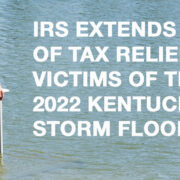How Missouri Is Faring With Tax Relief And Cannabis Reform
How Missouri Is Faring With Tax Relief And Cannabis Reform
This month the “Show-Me State” is receiving tax relief and will include a referendum this November for Missouri voters to approve adult-use cannabis in Missouri.
The IRS announced on August 10, 2022 that flooding victims in parts of Missouri now have until November 15, 2022 to file various individual and business tax returns and make tax payments.
The IRS is offering relief to any area designated by the Federal Emergency Management Agency (FEMA) as qualifying for individual or public assistance. Currently, individuals and households that reside or have a business in the Independent City of St. Louis, as well as St. Charles, Montgomery and St. Louis counties in Missouri qualify for tax relief. The same relief will be available to any other locality added later by FEMA. The current list of eligible localities is always available on the disaster relief page on IRS.gov.
IRS Tax Relief Details
The tax relief postpones various tax filing and payment deadlines that occurred starting on July 25, 2022. As a result, affected individuals and businesses will have until November 15, 2022, to file returns and pay any taxes that were originally due during this period.
Additionally, individuals who had a valid extension to file their 2021 return due to run out on October 17, 2022, will now have until November 15, 2022, to file. However, because tax payments related to these 2021 returns were due on April 18, 2022, those payments are not eligible for this relief.
The November 15, 2022 deadline also applies to quarterly estimated income tax payments due on September 15, 2022, and the quarterly payroll and excise tax returns normally due on August 1, 2022 and October. 31, 2022. Businesses with an original or extended due date also have the additional time including, among others, calendar-year partnerships and S corporations whose 2021 extensions run out on September 15, 2022 and calendar-year corporations whose 2021 extensions run out on October 17, 2022.
In addition, penalties on payroll and excise tax deposits due on or after July 25, 2022 and before August 9, 2022 will be abated as long as the deposits are made by August 9, 2022.
Tax Planning Tip
Individuals and businesses in a federally declared disaster area who suffered uninsured or unreimbursed disaster-related losses can choose to claim them on either the return for the year the loss occurred (in this instance, the 2022 return normally filed next year), or the return for the prior year (2021). Be sure to write the appropriate FEMA declaration number on any return claiming a loss.
Here are the applicable FEMA declaration number to use: FEMA declaration number – DR-4665-MO
Importance To Preserve Records
Keep in mind that the IRS has up to three years to select a tax return for audit. The FTB has up to four years to select a tax return for audit. In some cases this period is extended to six years. When a taxpayer is selected for audit, the taxpayer has the burden of proof to show that expenses claimed are properly deductible. Having the evidence handy and organized makes meeting this burden of proof much easier.
Essential Records to Have for a Tax Audit
If you are getting ready for a tax audit, one of the most important things to do is gather and organize your tax records and receipts. There’s a good chance that you have a large amount of documents and receipts in your possession. No matter how organized you are, it can be a daunting task to collect the right pieces and make sure that you have them organized and handy for the audit conference.
We have seen many tax audits that hinge on whether or not the taxpayer can provide proper documentation for their previous tax filings. A tax lawyer in Orange County or elsewhere can make sure that the documentation is complete and proper. By submitting this to your tax attorney in advance of the audit, your tax attorney can review your documentation and determine if there are any gaps that need to be addressed before starting the dialogue with the IRS agent.
So what are the most essential tax records to have ahead of your audit? Here are a few must-have items:
- Any W-2 forms from the previous year. This can include documents from full-time and part-time work, large casino and lottery winnings and more.
- Form 1098 records from your bank or lender on mortgage interest paid from the previous year.
- Records of any miscellaneous money you earned and reported to the IRS including work done as an independent contractor or freelancer, interest from savings accounts and stock dividends.
- Written letters from charities confirming your monetary donations from the previous year.
- Receipts for business expenses you claimed.
- Mileage Logs for business use of vehicle.
- Entertainment and Travel Logs for business
Tips On Reconstructing Records
Reconstructing records after a disaster is important for several reasons including insurance reimbursement and taxes. Most importantly, records can help people prove their disaster-related losses. More accurately estimated losses can help people get more recovery assistance like loans or grants.
Whether it’s personal or business property that has been lost or destroyed, here are some steps that can help people reconstruct important records.
Tax records
Get free tax return transcripts immediately using the Get Transcript on IRS.gov or through the IRS2Go app. Tax return transcripts show line-by-line the entries made on your Federal income tax returns. The most three recent tax years are available.
Financial statements
People can gather past statements from their credit card company or bank. These records may be available online. People can also contact their bank to get paper copies of these statements.
Property records
- To get documents related to property, homeowners can contact the title company, escrow company or bank that handled the purchase of their home or other property.
- Taxpayers who made home improvements can get in touch with the contractors who did the work and ask for statements to verify the work and cost. They can also get written descriptions from friends and relatives who saw the house before and after any improvements.
- For inherited property, taxpayers can check court records for probate values. If a trust or estate existed, taxpayers can contact the attorney who handled the trust.
- When no other records are available, people should check the county assessor’s office for old records that might address the value of the property.
- Car owners can research the current fair-market value for most vehicles. Resources are available online and at most libraries. These include Kelley’s Blue Book, the National Automobile Dealers Association and Edmunds.
Develop And Implement Your Backup Plan
Do not wait for the next disaster to come for then it may be too late to retrieve your important records for a tax audit or for that matter any legal or business matter. And if you do get selected for audit and do not have all the records to support what was claimed on your tax returns, you should contact an experienced tax attorney who can argue the application of your facts and circumstances to pursue the least possible changes in an audit.
Missourians Will Vote on Adult-Use Cannabis This November
Activists from Legal Missouri 2022 received certification from Secretary of State Jay Ashcroft on August 9, 2022 for an adult-use cannabis ballot measure that voters will consider this November. Medical use cannabis is currently legal in Missouri. If this measures passes, Missouri will become the 20th state to legalize adult-use cannabis. The proposed constitutional amendment will be listed on the ballot as Amendment 3 and would allow Missourians ages 21 and older to possess, consume, purchase and cultivate cannabis.
In addition, the ballot measure aims to establish a lottery to award licenses distributed equally to congressional districts. A new category of cannabis licenses would be reserved for small businesses, which, over time, would add a minimum of 144 licensed facilities to the existing 393 medical cannabis businesses in the state. Each of the state’s eight congressional districts would include at least six new retail licenses for adult-use cannabis under the new category.
Finally, the proposal would require a registration card for personal cultivation and impose a 6% tax on cannabis sales, among other provisions.
The 6% state sales tax would generate an estimated annual revenue of more than $40 million, according to a state auditor’s projection analysis. That money would cover the costs associated with implementing a state-licensed program as well as automatic expungement, with remaining funds allocated to veterans’ services, drug addictions treatment and Missouri’s public defender system.
Conflict With Federal Law
Missouri joins 36 other states in allowing medical use cannabis, but under Federal law any use or possession of cannabis is illegal. Specifically, under Federal law (Controlled Substances Act 21 U.S.C. 801) marijuana is designated as a Schedule I controlled substance due to the historical belief that it has a high potential for abuse, no currently accepted medical use in treatment, and lack of accepted safety for use under medical supervision. Such Federal law imposes barriers to the state-licensed cannabis industry including higher taxes and lack of access to banks and lending institutions.
What Should You Do?
The tax attorneys at the Law Offices Of Jeffrey B. Kahn, P.C. located in Orange County (Irvine), San Diego County (Carlsbad) and elsewhere in California are highly skilled in handling tax matters and can effectively represent at all levels with the IRS and State Tax Agencies including criminal tax investigations and attempted prosecutions, undisclosed foreign bank accounts and other foreign assets, and unreported foreign income. Also if you are involved in cannabis, check out what a cannabis tax attorney can do for you. And if you are involved in crypto currency, check out what a bitcoin tax attorney can do for you.











 Follow
Follow Follow
Follow